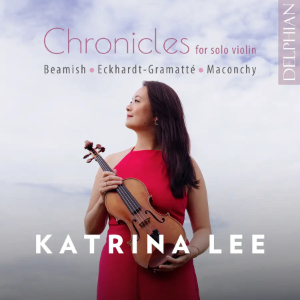
Chronicles for solo violin
Sophie-Carmen Eckhardt-Gramatté (1899-1974)
Ten Caprices (1924-1934)
Sally Beamish (b.1956)
The Wise Maid (1998, rev. violin, 2011)
Elizabeth Maconchy (1907-1994)
Six Miniatures (1966)
Katrina Lee (violin)
rec. 2024, The Robin Chapel, Edinburgh
Delphian DCD34338 [78]
It’s very unusual to find Sophie-Carmen Eckhardt-Gramatté’s Ten Caprices for solo violin on disc and I’ve never come across a competing disc, though I suppose there must be one. The violinist, pianist, composer and teacher wrote them over the course of a decade and they vary greatly in length and expressive complexity, from just over two minutes to nine. They sport descriptive titles, in the main, which gives an indication of the mood they’re intended to convey, but they can be listened to independent of such literary allusions. The first two were inspired by her first husband and show Baroque-tinged writing, whether in the Sarabande-like first or the dance-patterned second. The third is slow-moving and melancholic whilst some of the following ones reflect her travels around Europe. No.4 for instance is inspired by Mallorca which inspires her to dappled wave-lapping pizzicati followed by virtuosic flourishes, ending satisfyingly with a resumption of the pizzicati.
There are dance caprices, a Caprice devoted to birdsong, both high and low, as well as a more chic contemporary one that charts a train journey – possibly Honegger’s Pacific 231 might have been on her mind – with the train gathering steam excitingly. There’s an Elegie and some resinous attaca elements, as well as contrasting folklore, in Caprice 9, subtitled ‘Chestnut Hill at Night’. The courtly conclusion of the set of Caprices also offers a rather brittle lament, in Klag, a gathering sadness bringing the set to a close.
Sally Beamish’s The Wise Maid is a three-minute interlude, a crisp set of variations on an Irish folk tune, which manages, even in this short span, to be arresting in its control of veiled folk insinuation and zesty liveliness.
This is the premiere recording of Elizabeth Maconchy’s Six Miniatures of 1966 which she never published. Originally five, she expanded it to six which entailed the inclusion of two Preamble movements. She ensures that there are plenty of inter-connections between the brief movements – open intervals for one – but variations in tempi, and certain explicit qualities, such as pathos, allow the music to expand where necessary. Conversational intensity, drones and vivid rhythmic figures are all part of Maconchy’s arsenal and the presence of Bartók is genially present in a few places.
Katrina Lee is currently Principal Second Violin of the Scottish Ballet Orchestra and this disc is part of her drive to promote women composers’ music in attractive programmes. Lucy Walker’s notes are very helpful but I wish she’d given less time to ruminations about Simon Heffer’s views of Errolyn Wallen and rather more to the essential business of dating these pieces. The recording in The Robin Chapel, Edinburgh has been extremely well judged by Paul Baxter. I’ve heard a number of recordings of individual Eckhardt-Gramatté Caprices that are unattractively resinous and spiky but this one sits the violin in the church acoustic to great advantage.
Jonathan Woolf
Buying this recording via a link below generates revenue for MWI, which helps the site remain free


















